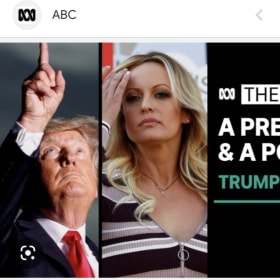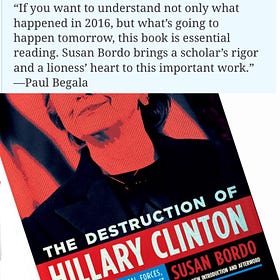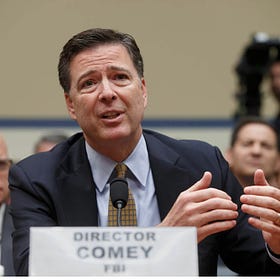Remembering How Close Trump Came to Losing the 2016 Election
Some context for the “Access Hollywood” Tapes and their relation to the current charges against Trump. From my book on the 2016 election.
After the conventions, there were the debates, expected to be the oddest piece of political theater we had seen yet during the election cycle. And they were. During the first debate, on September 26, Trump sniffled his way through largely incoherent answers and constant interruptions of Hillary’s calm, knowledgeable performance. Then, at the very end, she caught Trump completely off-guard with an unexpected reference. Lester Holt was just about to ask his final ques- tion, when Clinton interjected, “One thing, Lester . . .”
“This is a man who has called women pigs, slobs, and dogs, and someone who has said pregnancy is an inconvenience to employers… And one of the worst things he said was about a woman in a beauty contest. He loves beauty contests, supporting them and hanging around them. And he called this woman “Miss Piggy.” Then he called her “Miss Housekeeping,” because she was Latina. Donald, she has a name.Her name is Alicia Machado.”
Trump was clearly discombobulated, and responded with what we now can recognize as a threat of things to come: Hillary had not been “nice” to him, and so the gloves were going to come off:
“I was going to say something extremely rough to Hillary, to her family, andI said to myself, “I can’t do it. I just can’t do it. It’s inappropriate. It’s not nice.” But she spent hundreds of millions of dollars on negative ads on me, many of which are absolutely untrue. They’re untrue. And they’re misrepresentations. And I will tell you this, Lester. It’s not nice. And I don’t deserve that.”
After the debate, an online NBC News/Survey Monkey poll found that 27 percent of likely women voters said the debate had made them think worse of Trump, despite the fact that few viewers had heard of Alicia Machado or knew what incident Hillary was referring to. That was to change by morning, as a new, perfectly timed ad from Hillary’s campaign told us the whole story of how Trump, then executive producer of the Miss Universe pageant, had called Mach- ado “Miss Piggy” and “an eating machine” after she gained what he called “massive amounts of weight” (actually fifteen pounds) during her tenure as Miss Universe. In the ad, Machado, besides detailing Trump’s fat-shaming response to her weight gain, also mentioned a five-year-long struggle with an unspecified eating disorder, and described how Trump had put her issues with weight on display in a video feature of her exercising at a gym.
Trump’s response was to double down: “She was the winner and she gained a massive amount of weight, and it was a real problem.” He tweeted that Machado was “disgusting” and accused her of having a sex tape. And before long, the Associated Press was reporting that “Having drawn closer to Mrs. Clinton in the polls, Mr. Trump now faces an intensified clash over his personal temperament and his attitudes toward women and minorities—areas of grave concern for many voters that were at the center of the candidates’ confrontation [at the debate] on Monday.”
“Women Won’t Elect a Fat-Shamer-in-Chief” was the headline of a Huffington Post piece by Laura Bassett that not only detailed Trump’s remarks about Machado (and Kim Kardashian and Rosie O’Donnell) but also recalled Ivana Trump’s distress when her husband began an affair with model Marla Maples, telling Ivana he couldn’t be sexually attracted to her anymore because her body was that of a woman who had had children. (Ivana had two cosmetic surgeries, but to no avail.)
Trump was in trouble. And it only got worse just a bit over a week later, when the 2005 Access Hollywood tapes broke. At first, to my amazement, MSNBC announced their release as just another “problem” for Trump’s “gender gap” (while continuing to report the drip of Hillary’s emails as potentially fatal). But they had underestimated not only the outrage of women, but also the GOP’s horror at having their nominee revealed to be such an enemy of “family values.” This was their signature, their trademark! And now a hot mic had revealed not merely that the newly married Trump had had extramarital affairs—that was a glass house few politicians could stand in—but had boasted that “when you’re a star” you can do anything you want to women:
“I’m automatically attracted to beautiful women—I just start kissing them, it’s like a magnet. Just kiss. I don’t even wait. And when you’re a star, they let you do it. You can do anything. Grab ’em by the pussy.”
Earlier in the conversation, Trump recalls trying to put the moves on a married woman:
.” . . I failed. I’ll admit it. I did try to fuck her, she was married . . . and I moved on her very heavily. I took her out furniture shopping. She wanted to get some fur- niture and I told her “I’ll show you where you can get some nice furniture.” I moved on her like a bitch, and I could not get there, and she was married. And all the sudden I see her and she’s got the big phony tits, she’s totally changed her look.”
A massive GOP distancing followed. Paul Ryan said he was “sickened” by Trump’s remarks. Mitch McConnell invoked his three daughters and described Trump’s comments as showing an “utter lack of respect for women.” RNC chairman Reince Priebus said “No woman should ever be described in these terms or talked about in this manner. Ever.” Governor Gary Herbert of Utah: “beyond offensive and despicable.” Mitt Romney: “Such vile degradations demean our wives and daughters and corrupt America’s face to the world.”
There was a general sense that Trump’s abuses had finally “gone too far.” Within days, Hillary’s numbers were climbing to a significant lead, and Michelle Obama had delivered a gripping speech in which she described Trump’s behavior as having “shaken me to my core in a way I could not have predicted.” There was GOP talk of reversing the ticket, and putting Pence at the top. Chuck Todd speculated that Trump might not even show up for the next debate.
But Trump had other ideas in mind. “I’ve said some foolish things,” he admitted, on a video posted to his Facebook page, “but there’s a big difference between the words and actions of other people. Bill Clinton has actually abused women, and Hillary has bullied, attacked, shamed, and intimidated his victims. We will discuss this more in the coming days. See you at the debate on Sunday.”
Throughout the election, Trump had been threatening to bring Bill’s sexual troubles back onto center stage if Hillary wasn’t “nice” to him. Now, true to his promise and clearly finished with being “nice,” ninety minutes before the October 9 debate, Trump staged a media event with three women who decades ago had accused Bill Clinton of sexual misconduct and one woman who was twelve when Hillary Clinton was the court-appointed defender for the man who raped her. Trump also invited them into the debate hall as his guests; they sat in a row, portending of ominous accusations to come during the debate, while television cameras flipped back and forth between them and the row occupied by Bill and Chelsea.
It was a reality-TV event, highly orchestrated and of no relevance to Hillary’s fitness for the presidency. But Trump tried to milk it for all it was worth. Anderson Cooper, early in the debate, brought up the subject of the Access Hollywood tapes, and Trump reminded us, once again, that: “If you look at Bill Clinton, far worse. Mine are words and his was action. What he’s done to women, there’s never been anybody in the history of politics in this nation who’s been so abusive to women.” Trump’s assumption that words are always more “innocent” than “action” shows his lack of understanding of just what was so abusive—what it was that shook Michelle Obama “to [her] core”—about what he said to Billy Bush.
To my mind, what was so revolting about the Access Hollywood conversation was not that Trump had extramarital sex, or even that he bragged about his “conquests,” but that he did so with such utter disdain, such contempt, for the women whose “pussies” he grabbed, with their “big, phony tits” and readiness to “do anything” for a star. It was that attitude that sent many women casting early votes for Clinton: “I didn’t vote for her because she’s a woman,” as a sixty-six-year-old retired teacher in Arizona said, “I vote for her because as a person who has been in a domestic violence situation, Donald Trump scares the livin’ bejeebers out of me.”
Anderson Cooper, repeatedly questioning Trump as to whether he had done any of the things he bragged about on the tape, finally got an explicit denial from Trump. The “No, I didn’t” was sandwiched in hurriedly between two other points, and it was obvious that Trump knew he was lying and would probably get himself in trouble with it.
He did. Within days several women had come forward, and ultimately a dozen women—journalists, beauty contestents, receptionists—alleged that Trump kissed and groped them against their will. Machado was an insult, and the Access Hollywood tapes were revolting, but this was alleged assault—a trauma with which one in six American women has had a personal experience. Millions of women, both Democrats and Republicans, could relate. By late October, the allegations were well on their way to creating what might have become a bipartisan coalition of female voters against Trump, with eight million women responding to a tweet asking them to describe their personal experiences with sexual assault. Several public figures told their stories, too, on television.
It seemed at that moment as though, despite the emails, the Clinton Foundation, the GOP hate-mongering, the media’s exaggeration of every “scandal” and Sanders’s splitting of the democratic ranks, Trump was about to be decisively vanquished. The polls were all strongly predicting it. A Clinton victory seemed, for the first time in months, a virtual inevitable.
That wasn’t to be.
FBI Director James Comey had already gone way beyond FBI protocol, and according to many commit a gross abuse of his own power, when, in early July, he had described Clinton’s handling of emails as “careless.” He also revealed a shifting set of scruples about what the public has a right to know, displaying no obligation to publicly correct the record on Clinton’s “carelessness” when Elijah Cummings and Matt Cartwright pressed him to admit that Clinton had not acted carelessly (and by implication, not lied) in treating unmarked emails as unclassified. (See my stack on the “Email scandal”1
Yet, on October 28 he compounded his earlier actions and ignored the Justice Department’s guidelines barring the release of information about ongoing investigations—or even returning indictments—involving individuals running for office in close proximity (within sixty days) to an election, and sent a letter to Congress saying that “in connection with an unrelated case, the FBI has learned of the existence of emails that appear to be pertinent to the investigation.” These emails, discovered on the laptop of Anthony Weiner, former congressman and husband of Clinton’s aide and confidant Huma Abedin, needed to be reviewed to “determine whether they contained classified information, as well as to assess their importance to the investigation.”
Comey’s motives for this extraordinary additional breach of protocol remain unclear. He tried to justify them, but—as I’ve argued2 —unconvincingly. And whatever his motives, the slime factor went beyond his actions. As Rudy Giuliani’s undisciplined blabbing revealed, Trump campaign officials actually knew Comey’s letter to Congress was coming beforehand, and made the most of it: “I think [Trump’s] got a surprise or two that you’re going to hear about in the next few days . . . a couple of things that should turn this around,” Giuliani told Fox the day before Comey’s letter to Congress surfaced; he also couldn’t resist bragging that he had insider knowledge of “a kind of revolution going on inside the FBI” springing from tensions between those who supported Comey’s legal exoneraation of Clinton and those—the same New York faction for whom Clinton Cash was a bible—who were out for more blood. E. J. Dionne had suggested that it’s likely that Comey’s hand was forced by this faction, either in collusion with Giuliani or simply out of their own hatred for Clinton. What is clear, though is that, as Steven Rosenfeld wrote in Alternet, there was “a cadre of Hillary-hating agents that pushed the Bureau to interfere in the 2016 election in a manner that can only be described as an attempted coup.”
Consider the timing:
It’s eleven days before the election, Clinton has three successful debates behind her, Trump’s nasty behavior with women is on garish display, and the polls are looking really good for Hillary. Then: “FBI says emails found in Anthony Weiner’s sexting scandal may have links to Clinton inquiry” (headline in the Los Angeles Times).
The damned emails were front and center again, and both the GOP and the media treated the news as explosive. MSNBC’s Kristen Welker declared that the “full enormity” of this new information could “up-end the entire election.” And Donald Trump, at the opening of a campaign rally in New Hampshire, made the most of Comey’s announcement: “Hillary Clinton’s corruption is on a scale we have never seen before. We must not let her take her criminal scheme into the Oval Office.” Referring to Comey’s original exoneration, he applauded the FBI for revisiting the case: “This was a grave miscarriage of justice that the American people fully understood. Perhaps finally justice will be done.”
The FBI’s conclusion was not what Trump intimated it would be. As Clinton’s campaign had suspected was the case, the emails were revealed to be duplicates of those already scrutinized and found entirely innocent by the FBI.
By then, however, the election was just two days away.
How harmful to Clinton was the second Comey intervention? Common sense alone suggests that the revival of “the email scandal,” which had led so many Americans to see Clinton as untrustworthy and a liar, would have had a significant effect. Before the “new” email investigation was announced, the national consciousness was awash with revulsion and condemnation of Trump over the Access Hollywood tapes and the allegations that followed. After Comey’s letter? For all intents and purposes it was as though the Access Hollywood tapes had never happened, and the twelve women alleging abuse had never come forward. “Breaking News” of “new email revelations” swept all that away.
What we didn’t know at the time was that at least two women, immediately after the Access Hollywood tapes were leaked, were “hushed” into purchased silence about their sexual relations with Trump. The Trump campaign felt—whether rightly or wrongly we’ll never know—that his failing rep among prospective women voters would surely be sunk if these affairs (one with a “porn star,” another with an ex-Playboy bunny, and both while he was married) were made public. And with the election right around the corner, they could take no chances.
“Access Hollywood” was hideous.. But suppressing the first-person accounts of Stormy Daniels and Karen McDougal went beyond sexually gross behavior. Since the pay-offs were consciously and deliberately made in order to control a potentially destructive anti-Trump “wave” occurring right before the election, they constituted a criminal scheme to interfere with the election:
Why I Don't Want to See Another Piece with "Porn Star" in The Headline
Interested in reading more from my book on the 2016 election? Let me know and I’ll publish more excerpts. And of course, I’d be delighted if you purchase the book itself!









This is a sobering reminder of all the steps that led to Hillary’s defeat right before the election, and it brings back the shock I felt that all the sexual assault charges against Trump seemed to vanish or no longer matter. The weekend before the election, while knocking on doors to get out the vote for Hillary in New Hampshire, the group I was with drove by a town crossing where some MAGA women were vociferously cheering and waving signs along the lines of “You can grab us by the pussy anytime!” Ugh. That’s when I knew something was very askew, even though I didn’t want to believe it.
If anyone deserved to be President, it is Hillary. She represents the best in American women, especially her remarkably strong generation.